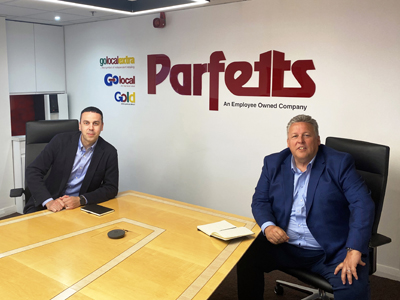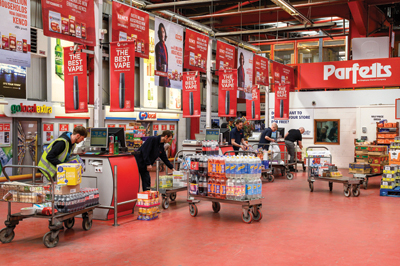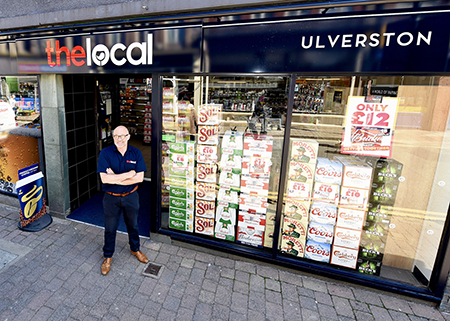Evolution not revolution: Swindell and Robinson on their plans for Parfetts
In their first in-depth interview since becoming joint MDs of Parfetts in January, Noel Robinson and Guy Swindell talk about symbol groups, trading with customers, and employee ownership.
 A record year for Parfetts has resulted in the employee-owned business awarding a 14% tax-free bonus to every one of its 853 staff.
A record year for Parfetts has resulted in the employee-owned business awarding a 14% tax-free bonus to every one of its 853 staff.
In the year ending 30 June 2021, the C&C/wholesaler achieved a £570 million turnover, up 28% on the previous year, and £14.6 million pre-tax profit, up 26%.
Joint managing directors Guy Swindell and Noel Robinson (pictured left and right respectively), who took over from Greg Suszczenia and David Grimes in January, spoke to Cash & Carry Management’s managing editor Kirsti Sharratt about their plans and strategy for the business.
To what do you attribute Parfetts’ success in the last financial year?
Employee ownership is at the heart of the business. All the staff really do go the extra mile to deliver great customer service, and that in turn drives sales.
Obviously, this last financial year covered a lot of the pandemic, which was a massive influence on the figures, but we have sustained that level of turnover. We’ve got a very strong cash & carry performance. Delivered accounts for a third of our turnover, and that is being driven by our symbol group Go Local.
How are turnover and profits tracking in this current financial year?
We’re in double-digit growth again, but our bottom line won’t be as good as last year. That’s because of the inflationary costs we are dealing with. Our targets are based on the sales and growth bonuses that we award to all colleagues – we have a framework around 5% 7.5% and 10% growth figures.
What are your priorities for this year?
Delivery is where we’re pushing growth. We’re looking at new business areas that we can go into and recruit. We have nearly 30 people out on the road, and they are tasked with looking after existing customers and recruiting new ones. Our delivery radius is 100 miles from each depot, but that covers a lot of area, including places like Coventry, Leicester and Birmingham, so there’s tons more business to get. We’re boxing clever and trying to ‘exhaust an area’; we’re looking to make our routes more efficient.

Parfetts champions cash & carry and continues to promote it to retailers.
We’re still championing cash & carry as well. It’s about trying to keep the business we have and also grow where we can. We’re definitely in the market to expand, whether that’s by gaining new customers from our current depots, or by opening a new depot or by acquisition – but there are no new depots in the pipeline at the moment!
We have a new mission statement: ‘An employee-owned company that is supporting independently owned customers to grow.’ That encapsulates what we’re trying to do.
What is your growth strategy?
We had an off-site meeting in February for directors, heads of department and general managers where we presented some ideas on how we could drive efficiency to keep adding value to our customers. The title for that session was ‘Evolution, Not Revolution’. We know what makes Parfetts tick. We will continue to do that, but we’ve got to evolve.
For example, we’re investing in Optrack route optimisation and load planning software that will help working practices around the delivered part of our operation. We didn’t do any deliveries until 2015, so it’s fairly new to us. We’ve learned some lessons, and we can now start to refine our model.

An investment in Optrack route optimisation software will bring efficiencies to the business.
Last year we invested heavily in the Aintree site. We put in a dedicated picking area and a new loading facility, which means we can now get all the vehicles loaded and out by 7am. This improves efficiencies and even gives us the potential to do second delivery drops – our drivers that do local deliveries can get back by midday, and out again by 12:30pm. We are doing something similar in Sheffield now as well.
Our GOLD model [a 24-hour model where depots work as a cash & carry from 6.30am to 6.30pm and are then used by the delivery and click & collect teams to pick orders through the night] is in six of our seven sites. We don’t deliver out of our Anfield branch just because of its size, but we’ve got Aintree up the road which obviously covers Liverpool and the North West.
The GOLD hybrid model does work but we’re very keen to continue to push cash & carry. We don’t want to lose any C&C business, and we have no plans to change any of our sites to delivered only.
How are you protecting your cash & carry business?
We make sure that there’s always a hive of activity in the depot – promotions on tower ends, lots of activity in the aisles, front-of-depot displays, supplier days.
We’re working with Coke at the moment, installing some digital screens into all depots apart from Anfield and Middlesbrough. We want to understand what this delivers for customers – will it pique their interest?
We have direct loads, we have multiple checkouts, we are well staffed, we carry a massive range [6,500 lines] and our opening hours are attractive. We have parking and are located just off motorways, so we’re quick to get to. One thing you see with us are very busy car parks, and that’s different from a lot of our competitors.
We have cafés in every cash & carry, so it’s still a good experience for our retailers to spend time in the depot. And retailers can trade with us!
How much flexibility do your managers have in trading with customers?
A lot! We really encourage it. Independent retailers want to know that they’re getting the best price – they want to negotiate at a local level.
How are you managing price increases?
We’re incredibly busy because we’ve seen price increases like we’ve never seen for probably a decade. What we’re doing is passing on manufacturers’ price rises to the customer – but not a penny more. We’re trying to do the right thing by our customers.
There’s a lot more understanding in the world right now about price increases. The big debate in our sector would be about price-marked packs – they are the honest broker in the supply chain. Soft drinks have broken through the £1 barrier, as have some items of confectionery, but not snacks. The pound will come under more and more pressure.
Last year you introduced your own range of price-marked products. Where are you with that?
 We quickly developed around 150 PMPs. We started in grocery and moved into impulse, and the latest development is a range of hanging bags of sugar sweets at £1. Our energy drinks range is doing really well, and we have very good sales of toilet rolls. We have different brand names, like Zenergy for energy drinks and Jungle Pops for kids’ drinks. We’re currently looking at flavoured water, cider and wine. We’re trying to give our customers a unique proposition with better margins.
We quickly developed around 150 PMPs. We started in grocery and moved into impulse, and the latest development is a range of hanging bags of sugar sweets at £1. Our energy drinks range is doing really well, and we have very good sales of toilet rolls. We have different brand names, like Zenergy for energy drinks and Jungle Pops for kids’ drinks. We’re currently looking at flavoured water, cider and wine. We’re trying to give our customers a unique proposition with better margins.
Are you confident that you can maintain your overall margin this year?
Yes, it’s all about giving value to our customers. The key is tying the customer in, and that’s where symbol comes in. If we can recruit a customer and have a long-term agreement with them through our symbol, then we see a core spend come to us – the customer moves away from small, infrequent spends and buying on promotion to buying across categories and getting two deliveries a week. It also means that our deliveries become more efficient. It’s good for customers as well because they see an increase in footfall and profitability.
We have around 5,000 customers per week and, of those, around 1,000 are symbol and they account for about 36% of turnover.
With Go Local, do you have any conditions in terms of minimum spend or percentage of spend that retailers have to place with you?

Go Local is now in its 10th year.
Yes, we do, but it’s always tailored to the site and the retailer – we agree a realistic spend figure and that influences the amount that we invest in that store. We would look to mirror their ambitions, whether that’s a smaller store – say 1,000 sq ft – and the retailer is relatively new to the sector and wants support, or an established retailer with a 3,000 sq ft store looking to do a full refit.
This will be our 10th year of our Go Local symbol group, and we’re approaching 1,000 stores (750 Go Local and 250 Go Local Extra, which is full-store convenience including food to go and chill). It’s really exciting where we’ve got to. We cover the whole of the north of England and the Midlands, and we’re into Wales now as well.
Our base target for new Go Local stores is about 200 per year – that’s the challenge we’re giving head of retail Steve Moore. But we’re trying to get away from just the numbers – with the recruitment of Antony Downing [ex Costcutter] we have a new level of expertise in terms of store layout and format and so we are offering retailers more support, whether that’s around business operation, financing or drop shipment.
We signed a deal in January with Eden Farm to do drop shipment for chilled and frozen products. Before that, we were doing chilled and frozen from blue containers on our lorries. We started the Eden Farm service from our Sheffield site, and our roll-out programme will probably end in mid June. And then every delivered customer will have that opportunity.
What’s your minimum order and do you plan to introduce a delivery charge?
Our minimum order is moving to £750 excluding tobacco but we are not introducing a delivery charge. Our delivered customers get cash & carry pricing and access to Go Local promotions.
 Last summer you launched next-day delivery through your app. How much of your delivered business is your app accounting for?
Last summer you launched next-day delivery through your app. How much of your delivered business is your app accounting for?
Over 50%. It was the thing that attracted customers of our competitors to shop with us. That’s because our app offers the most efficient way to order in a store.
Are you working to develop your digital channels further?
Yes, every day. It’s the new arms race. We’re always going through new phases on our website and app, from marketing to the customer journey, and we’re working with suppliers. However we’re still really keen to have people on the road visiting retailers. We’ve seen competitors pull away from that, and we see that as a big advantage for us.
What support do you offer to unaffiliated retailers?
We have bespoke packages available; we’ve got something for everyone. Ultimately, Go Local and The Local are king, but if a retailer isn’t able to join our symbol – whether it’s due to the store size or promotional challenges – we can still offer store investment, such as signage or EPoS tills, to get them on the ladder towards Go Local or The Local.
Around 4,500 of our 5,000 customers are part of our retail club. That gives them the chance to run the promotion every three weeks. We provide consumer leaflets and distribute them free of charge.
How is The Local, your off-licence based symbol, progressing?

Haydn Hicks has helped Parfetts to shape The Local off-licence based symbol group.
The Local is now up to 15 stores following its launch last summer. We wanted retailers to help us shape the model, so Haydn Hicks, who had been in Bargain Booze for 26 years, came across along with the Reynolds family who had five Bargain Booze stores. We’ve worked closely with them in creating a new promotional package, consumer leaflet and instore theatre.
We hold a forum once a month with The Local retailers, where we review the previous promotion and talk about the next one. We really listen to them – they know what makes their stores tick so they can guide us.
It feels real now that we have 15 stores, and we’re looking to land around 50 more of The Locals this year. Haydn Hicks has said that his margin improved significantly by coming to us.
Are there any plans to invest in your own retail estate?
No, although we do actually have four company-owned stores which were purchased in around 2006 under Steve Parfett’s leadership. It’s a very difficult world to be in company-owned stores; ‘Let the pilot fly the plane’ is what we say. We have some fantastic independent retailers – let them take care of that side, and we’ll support them where we can.
Why did Parfetts decide to appoint joint managing directors again?
If it ain’t broke, don’t fix it! Prior to us, it was Greg (Suszczenia) and David (Grimes). They were at the helm as joint managing directors for the best part of 15 years. Both had different skill sets and different experiences, and it proved very successful. Prior to that, it was Steve and Robert Parfett, and their dad Alan, so when talking about succession, having joint MDs is a natural conversation.
Had you worked together before at all?
Noel: No, we hadn’t even met! The conversation started through Martin Race (chair of Parfetts’ employee trust board), who I worked for at Bestway.
What are your individual strengths and responsibilities?
Noel: Guy started on the tills 23 years ago so he knows every nook and cranny of this business, which is great for me because I hadn’t worked for Parfetts before June last year. What I bring is external experience and some new ways of working, some new ideas. We really complement each other. In terms of responsibilities, Guy is very customer-centric – marketing, IT, the website – and I’m very internally focused – numbers, operations, HR.
What about personality wise? How are you alike and how do you differ?
Noel: We actually did a personality test and both came out as ‘fire’. We are both driven and hard-working but quite relaxed as well. We have to be: Guy’s a Man City fan and I’m a Newcastle fan!
‘Being employee owned is a tremendous positive’
Parfetts has been fully employee-owned since October 2018 and this benefits not only the staff, but also customers and the business overall.
 Martin Race (pictured), the former MD of Bestway Wholesale who has been chairman of Parfetts’ employee trust board for more than two years, comments: “Being employee-owned is a tremendous positive which aids engagement and ensures the business is run for all, with targets that are reasonable and sales and profit bonuses available to all employees.”
Martin Race (pictured), the former MD of Bestway Wholesale who has been chairman of Parfetts’ employee trust board for more than two years, comments: “Being employee-owned is a tremendous positive which aids engagement and ensures the business is run for all, with targets that are reasonable and sales and profit bonuses available to all employees.”
He continues: “I have always strived for an excellent culture since my early days at Batleys, and we at Parfetts – although there is always more to do – have a great base culture aided by a trust board that includes employee directors, depot and head office employee ‘Voice’ councils, and a dedicated full-time ‘Voice’ manager, all of which contribute to the employee-owned business model.”
Joint MD Guy Swindell adds: “Being employee-owned affects every decision we make. We think as much about our colleagues as our customers.”
Employees are able to influence the direction of the business: they can make suggestions and ask questions through the Voice councils, the Voice manager Zoe Taylor, and directly to the joint MDs via a new ‘askguyandnoel’ email.
Parfetts is also very focused on developing its staff. “We always look to promote from within where possible,” says Swindell. “We advertise every single job internally and we interview all internal candidates.”
He concludes: “Our employees are effectively business owners, and that translates into the excellent service we give to our customers.”
Parfetts in numbers:
£570 million turnover, up 28% (year to 30 June 2021)
63% of turnover is accounted by C&C customers, 33% delivered, and 4% click & collect
£14.6 million pre-tax profit, up 26%
7 depots (Aintree, Anfield, Halifax, Middlesbrough, Sheffield, Somercotes, Stockport)
853 employees
14% tax-free bonus awarded to all employees on performance last year
5,000 active C&C customers
750 Go Local stores
250 Go Local Extra stores
15 The Local stores
4,500 members of retail club
75 delivery vehicles
50% of delivered orders are placed on the app
Published Date: March 29, 2022



